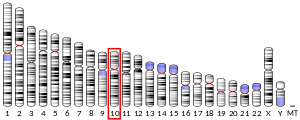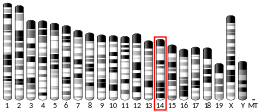MRPS16
28S ribosomal protein S16, mitochondrial is a protein that in humans is encoded by the MRPS16 gene.[5][6]
Mammalian mitochondrial ribosomal proteins are encoded by nuclear genes and help in protein synthesis within the mitochondrion. Mitochondrial ribosomes (mitoribosomes) consist of a small 28S subunit and a large 39S subunit. They have an estimated 75% protein to rRNA composition compared to prokaryotic ribosomes, where this ratio is reversed. Another difference between mammalian mitoribosomes and prokaryotic ribosomes is that the latter contain a 5S rRNA. Among different species, the proteins comprising the mitoribosome differ greatly in sequence, and sometimes in biochemical properties, which prevents easy recognition by sequence homology. This gene encodes a 28S subunit protein that belongs to the ribosomal protein S16P family. The encoded protein is one of the most highly conserved ribosomal proteins between mammalian and yeast mitochondria. Three pseudogenes (located at 8q21.3, 20q13.32, 22q12-q13.1) for this gene have been described.[6]
References
- 1 2 3 GRCh38: Ensembl release 89: ENSG00000182180 - Ensembl, May 2017
- 1 2 3 GRCm38: Ensembl release 89: ENSMUSG00000049960 - Ensembl, May 2017
- ↑ "Human PubMed Reference:".
- ↑ "Mouse PubMed Reference:".
- ↑ Lai CH, Chou CY, Ch'ang LY, Liu CS, Lin W (Aug 2000). "Identification of novel human genes evolutionarily conserved in Caenorhabditis elegans by comparative proteomics". Genome Res. 10 (5): 703–13. doi:10.1101/gr.10.5.703. PMC 310876. PMID 10810093.
- 1 2 "Entrez Gene: MRPS16 mitochondrial ribosomal protein S16".
Further reading
- Cavdar Koc E, Burkhart W, Blackburn K, et al. (2001). "The small subunit of the mammalian mitochondrial ribosome. Identification of the full complement of ribosomal proteins present". J. Biol. Chem. 276 (22): 19363–74. doi:10.1074/jbc.M100727200. PMID 11279123.
- Suzuki T, Terasaki M, Takemoto-Hori C, et al. (2001). "Proteomic analysis of the mammalian mitochondrial ribosome. Identification of protein components in the 28 S small subunit". J. Biol. Chem. 276 (35): 33181–95. doi:10.1074/jbc.M103236200. PMID 11402041.
- Kenmochi N, Suzuki T, Uechi T, et al. (2001). "The human mitochondrial ribosomal protein genes: mapping of 54 genes to the chromosomes and implications for human disorders". Genomics. 77 (1–2): 65–70. doi:10.1006/geno.2001.6622. PMID 11543634.
- Strausberg RL, Feingold EA, Grouse LH, et al. (2003). "Generation and initial analysis of more than 15,000 full-length human and mouse cDNA sequences". Proc. Natl. Acad. Sci. U.S.A. 99 (26): 16899–903. doi:10.1073/pnas.242603899. PMC 139241. PMID 12477932.
- Zhang Z, Gerstein M (2003). "Identification and characterization of over 100 mitochondrial ribosomal protein pseudogenes in the human genome". Genomics. 81 (5): 468–80. doi:10.1016/S0888-7543(03)00004-1. PMID 12706105.
- Ota T, Suzuki Y, Nishikawa T, et al. (2004). "Complete sequencing and characterization of 21,243 full-length human cDNAs". Nat. Genet. 36 (1): 40–5. doi:10.1038/ng1285. PMID 14702039.
- Gerhard DS, Wagner L, Feingold EA, et al. (2004). "The status, quality, and expansion of the NIH full-length cDNA project: the Mammalian Gene Collection (MGC)". Genome Res. 14 (10B): 2121–7. doi:10.1101/gr.2596504. PMC 528928. PMID 15489334.
- Miller C, Saada A, Shaul N, et al. (2005). "Defective mitochondrial translation caused by a ribosomal protein (MRPS16) mutation". Ann. Neurol. 56 (5): 734–8. doi:10.1002/ana.20282. PMID 15505824.



